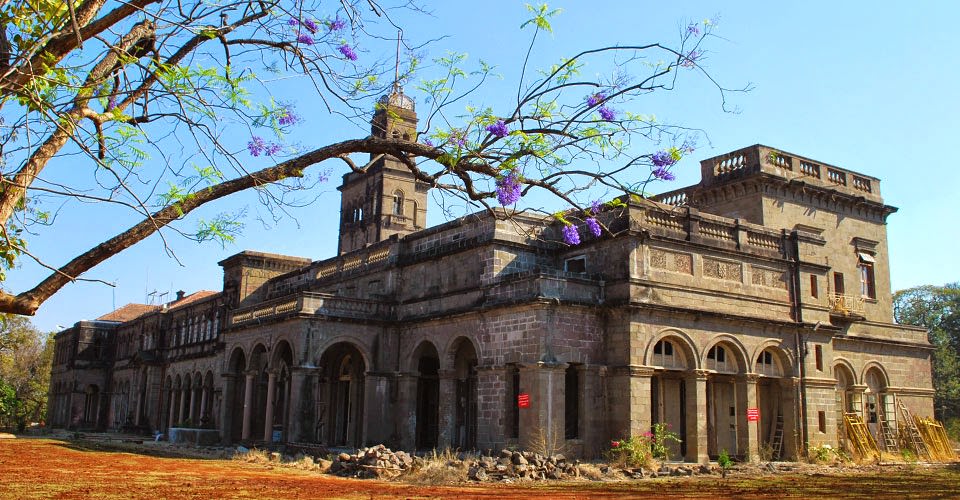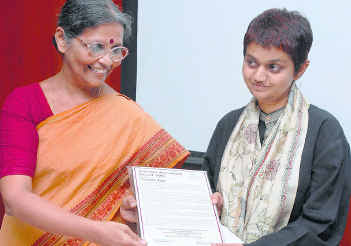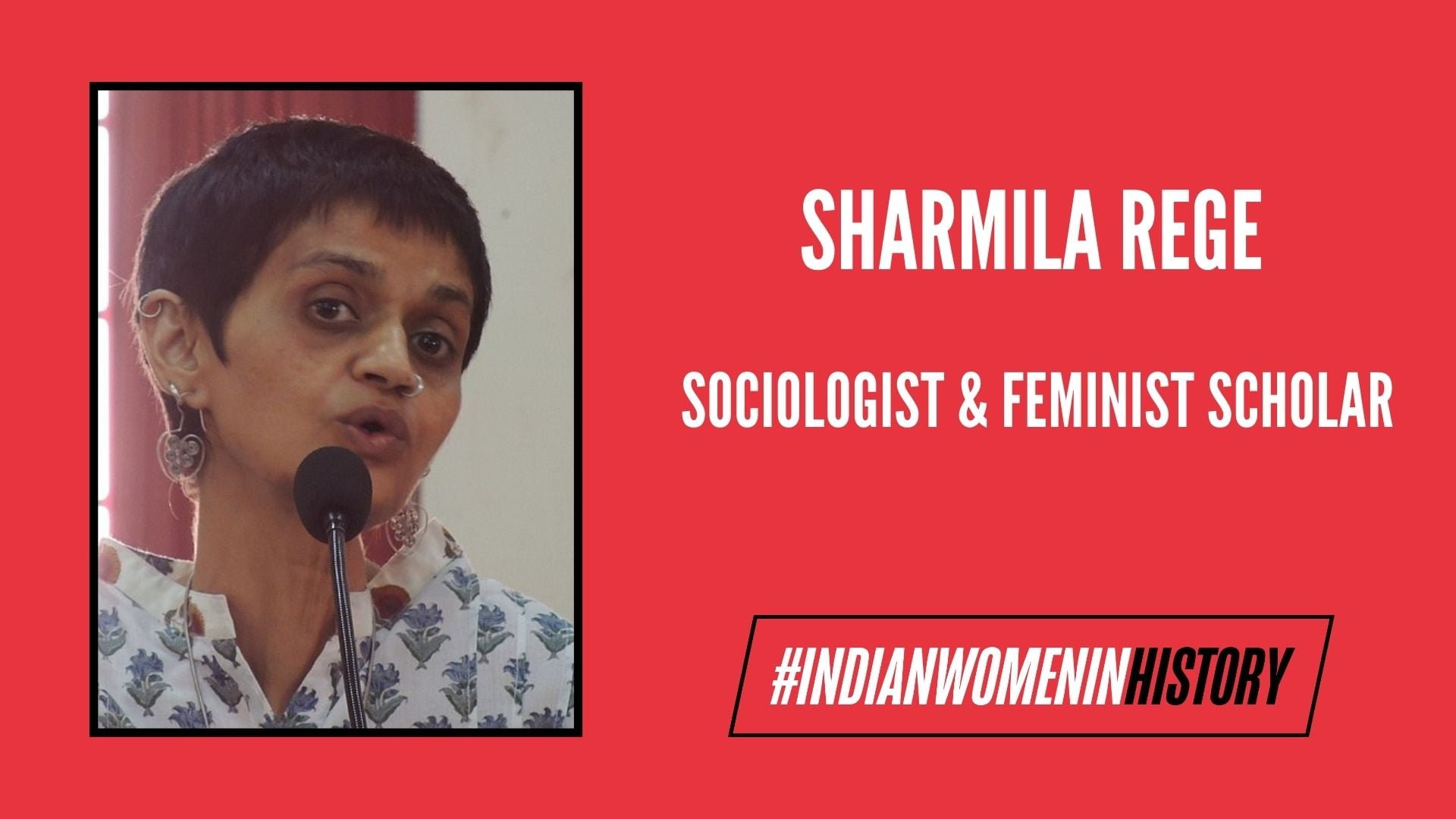7th October would have marked feminist and sociologist Sharmila Rege’s 53rd birthday if not for her untimely death after a battle with colon cancer on 13th July, 2013.
In her short life, Sharmila Rege made invaluable contributions to the academic and activist realms centered on Indian feminism.
Early Life
Born in Kolhapur, Rege was raised in Pune, where she would later study in Fergusson College’s Department of Sociology. In 1991, she began teaching at the Krantijyoti Savitribai Phule Women’s Centre which was a part of the Department of Sociology at the time. When the center became anonymous in 1998, Sharmila marked that there was a sudden dislocation akin to the feeling of “being lost to one’s discipline”.

In 2005, Rege became a professor at the Department of Sociology at the University of Pune. She would go on to teach sociology at the Indian Institute of Technology, Mumbai for a brief period only to return as director to the Krantijyoti Savitribai Phule Women’s Centre in 2008.
Body of Work
In 2006, she received the prestigious Malcom Adiseshiah award for distinguished contribution to Development Studies from the Madras Institute of Development Studies.
Sharmila Rege’s work must be placed in the three domains of sociology, women’s studies, and women’s movements. In an eccentric paper titled ‘Institutional Alliance between Sociology and Gender Studies: The Story of the Monkey and the Crocodile’, she attempts to integrate sociology and gender by carefully locating the specific history of sociology in Maharashtra. There existed a problematic interaction between the feminist attempt to utilize experience as a legitimate source of knowledge and the notion of a value laden ‘common sense’ that pervaded the discipline of Sociology (rooted in its patriarchal assumptions). Rege identifies the three positions that the project of integrating sociology with gender studies must undertake:
“The position of a feminist confronting patriarchies in sociology, both at the academic and institutional levels; two, the position of a third world feminist and sociologist confronting the agendas of western feminism and sociology; three, the position of a gender sensitive sociologist located in India, interrogating the complexities of caste, class, ethnicity and gender.”
Perhaps, her most debated upon contribution to the field of Women’s Studies would be the ‘Dalit-Feminist’ Standpoint. She argued that the masculinization of Dalithood and the Savarnisation of womanhood produces the classical exclusion and erasure of Dalit Womanhood. Rege uses Ambedkar’s definition of caste as endogamous class sustained through control over the woman’s sexual and reproductive activities. She explains that one cannot conceive of an adequate sexual politics without taking note of the intrinsic linkage between caste and sexuality.
The elevation of caste status finds expression in the withdrawal of the women that hail from such a location within the productive activities of the public sphere. The impurity of the Dalit man is justified through his failure to control the sexuality of ‘his’ woman. Consequently, sexual assault over Dalit women is a common practice employed to undermine Dalit manhood. Rege further explains how Bramhanism does not universalize a single patriarchal mode, but creates multiple patriarchies.
“A Dalit Feminist standpoint is seen as emancipatory since the subject of its knowledge is embodied and visible (i e, the thought begins from the lives of Dalit women and these lives are present and visible in the results of the thought). This position argues that it is more emancipatory than other existing positions and counters pluralism and relativism by which all knowledge based and political claims are thought to be valid.”
Rege went on to argue that ‘Dalit women’ itself cannot be conceived of as a homogenous category. Rege’s paper was a response to a paper written by Gopal Guru titled ‘Dalit Women Talk Differently’. Guru asserts that the autonomous mobilization of Dalit women is a unique epistemological standpoint.
The assertion that Dalit women talk differently allows for the emergence of an authentic representation of social reality. Rege found Guru’s argument problematic to the extent that authentic knowledge claims rooted in experience can lead to the formation of what she though to be narrow, identity politics limiting the emancipatory potential of the Dalit woman’s organisations.
“Dalit feminist standpoint which emerges from the practices and struggles of Dalit woman, we recognise, may originate in the works of Dalit feminist intellectuals but it cannot flourish if isolated from the experiences and ideas of other groups who must educate themselves about the histories, the preferred social relations and utopias and the struggles of the marginalised. A transformation from ‘their cause’ to ‘our cause’ is possible for subjectivities can be transformed. By this we do not argue that non-Dalit feminists can ‘speak as’ or ‘for the’ Dalit women but they can ‘reinvent themselves as Dalit feminists’. Such a position, therefore avoids the narrow alley of direct experience based ‘authenticity’ and narrow ‘identity politics’.”
Ambedkarite Feminists’ response to Sharmila Rege
The Dalit-feminist standpoint offers a radical re-envisioning of how activism and academia ought to operate in India. Nevertheless, it is certainly problematic how hailing from an upper caste location, Sharmila Rege seems to assert a certain hegemonic influence over the anti-caste academic and activist frameworks.
Also Read: The Truth About Fiction: Looking At Caste, Gender And Dissent In Urmila Pawar’s Short Stories
On Sharmila’s first death anniversary, Lata Pratibha Madhukar, a Dalit-Bahujan feminist writes:
“Is Sharmila Rege the representative of the mainstream in feminism and are Dalit-Bahujan feminists on the side streams? If this is true, it means that the scores of non-Brahmin women who have worked in the feminist movement, wrote, spread its thoughts, and struggled standing firmly on Phule-Ambedkarite thought are not mainstream. It creates an academic illusion that only Brahmin or upper caste women’s movement is ‘mainstream’.
Were Sharmila with us today, she would certainly have organized a talk on, ‘Is Mainstream feminism for a minority Brahmin/upper class or is it for Dalit-Bahujans too? Who is to decide?’ based on the questions I have raised here. Unfortunately, she is not with us. But let us hope that her colleagues will definitely take Sharmila’s legacy forward.
One cannot deny the fact that when Brahmins and other upper-castes take up Phule’s and Ambedkar’s thoughts, they receive a holy sanction in academic circles. Unintentionally, when Sharmila presents herself as a non-Dalit representative of the so-called main branch of the feminist stream she tries to free other upper class/caste feminists from their guilt and calculated silence on caste.”
Rege’s body of work hinges towards a logic of appropriation however well-meaning intentions she may have carried for it is impossible to absolve oneself of privilege and hold a casteless identity. Perhaps, Sharmila’s work can be celebrated for her stubborn attempt to disseminate Phule-Ambedkarite thoughts in elitist upper caste spaces.
To a certain extent, this attempt can be read as a significant interjection in an atmosphere where disinterest and apathy prevailed. While for the Dalit Bahujan readers for whom such ideas are not abstractions but the formulations of their lived reality, this attempt is actually that of a privileged woman trying to absolve herself of guilt in her complicit participation towards upholding the structure of caste and the calculated silence her fraternity holds towards the same.
Building Bridges: On Becoming a Welder

Sharmila Rege was a brilliant teacher with a rather radical pedagogical approach. She placed great emphasis on engaging with first generation learners and designed unique ‘bridge’ courses for non-English speaking students. Rege effectively created a bilingual system of teaching and training whereby students were not only encouraged to overcome their disadvantage through English language classes but were treated as the creative producers of knowledge in their own light. Her first manual titled ‘Building Bridges: On Becoming a Welder’ borrowed the motif of the ‘welder’ from Cherrie Moraga’s ‘The Welder’. The last two stanzas of the poem read:
I am the welder.
I understand the capacity of heat
to change the shape of things.
I am suited to work
within the realm of sparks
out of control.
I am the welder.
I am taking the power
into my own hands.
Sharmila Rege was the welder of reflexive thought regarding social location, different modes of linguistic expression, and computer lessons in a unique course that empowered first generation learners. Sharmila was extremely proud of one particular bilingual text produced by her students titled ‘Isn’t This Plate India- Hi Thali Bharatiya Nahi Ka?’ The work was a compilation of biographical narratives of Dalit men and women, the recipes they shared, and different students reflecting on what they had learned.
Final Words of Advice
Rege’s final work ‘Against the Madness of Manu: B.R. Ambedkar’s Writings on Brahmanical Patriarchy’ offered a detailed annotation of Babasaheb’s texts. On completing the book, Rege had stated that she can now die in peace. This was before she had been diagnosed with any illness and appeared to be fine outwardly.
Sharmila would end all her emails with Babasaheb’s quote:
“My final words of advice to you are educate, agitate and organize; have faith in yourself. With justice on our side I do not see how we can lose our battle.”
Also Read: Vina Mazumdar: A Pioneer Of Women’s Studies | #IndianWomenInHistory
About the author(s)
I'm pursuing a major in Economics and a double minor in film studies and peace and conflict studies and I strongly believe in the importance of words, particularly the ones that are left out.





Good article …Read on more of Sharmila’s article on http://sharmilarege.com/